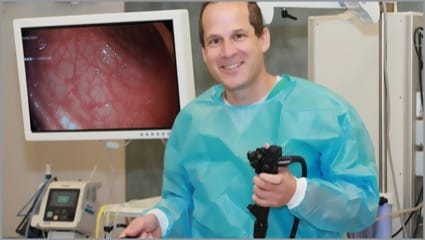
“Detecting IBD early would minimize disease deterioration, and thus the need for hospitalizations and surgical interventions,” said senior investigator Shomron Ben-Horin, MD, the chief of the Department of Gastroenterology at Sheba Medical Center and Tel Aviv University, in Israel, who presented the data at the 2022 Crohn’s & Colitis Congress.
Dr. Ben-Horin and his colleagues set out to develop a tool to expedite accurate diagnosis of IBD, noting that up to 23.5% of these patients initially receive an incorrect diagnosis that leads to treatment delays (J Clin Med 2019;8[4]:493). The investigators created an AI-based machine-learning algorithm (Predicta Med) that uses electronic health record (EHR) data to identify patients who may have IBD in the primary care setting.
Variables used by the algorithm include diagnoses, symptoms, laboratory test results, physician encounter notes, specialist or hospital visits, procedures, medications, clinical measurements, comorbidities, known risk factors for IBD, and demographic data, Dr. Ben-Horin said.
The team examined the accuracy of the program in detecting IBD in 1,214 adults who had been seen in the primary care setting and ultimately were diagnosed with IBD. The researchers obtained patients’ medical records from a nationwide healthcare database in Israel, including at least four years of data preceding the first relevant diagnostic test, procedure or referral to a specialist.
According to the researchers, the algorithm correctly identified 26.7%, 27.5%, 28.4% and 30.1% of patients with IBD one, two, three and four years, respectively, before the primary care provider’s initial suspicion of IBD.
For Crohn’s disease specifically, the algorithm identified 36% of patients one year before the primary care provider’s initial suspicion, 33% two years before, 33% three years before and 38% four years before. For ulcerative colitis, the algorithm predicted 17%, 22%, 23% and 23% of patients one, two, three and four years, respectively, before the primary care provider’s initial suspicion of IBD.
An algorithm like this one “can increase awareness of IBD among primary care providers and shorten the time to IBD diagnosis and treatment,” commented Shirley Cohen-Mekelburg, an assistant professor in the Division of Gastroenterology and Hepatology at Michigan Medicine, in Ann Arbor.
“In primary care clinical practice, this could be used to mark patients who may benefit from a clinical review or referral to a gastroenterologist to consider further evaluation for IBD,” said Dr. Cohen-Mekelburg, who was not involved in the research. She noted that the large sample size and the use of continuous data up to four years before an IBD diagnosis added strength to the findings.
Dr. Cohen-Mekelburg noted that other machine-learning tools are being developed for the IBD population to predict the risk for disease complications, hospitalizations and response to specific treatments (i.e., World J Gastroenterol 2021;27[17]:1920-1935).
Dr. Ben-Horin said one challenge in implementing algorithms like his group’s is they require specific EHR data. “Physicians should be able to address this challenge by working directly with any of the main EHR vendors.”
His group is testing the algorithm with more IBD data sets to further improve its accuracy, and he expects it will be available in the United States next year.
Published May 13, 2022, Gastroenterology & Endoscopy News